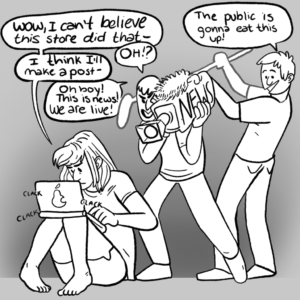The staff editorial is the majority opinion of The Murray State News Editorial Board

It’s always easy to ruin a good day if you have your cellphone handy. Pull up Facebook or Twitter and it won’t take long to find something which offends you so deeply you absolutely have to sound off about it.
Hobby Lobby has once again found itself at the center of one such internet crusade. This time the company hasn’t been busted for purchasing foreign artifacts or refusing to facilitate basic health care needs – instead, it is at the heart of a heated debate over merchandise deemed racially offensive.
The whole debacle stemmed from a singular comment on Facebook from a Texas woman by the name of Daniell Rider. She dinged the company for marketing “… a commodity which was gained at the expense of African-American slaves” as home décor. Her comment has elicited over 268,000 responses in a quickly growing thread.
But that’s not the real story.
Shortly thereafter, several articles made their rounds on Facebook deeming this the ‘age of the triggered millennial’ and the ‘end of common sense.’ Many also claimed boycotts were being staged and millions were declaring war against the company.
It’s easy to get riled up over inflammatory content and immediately share, retweet, message and repost without a second thought. But why, in our age of instant knowledge, are we so quick to believe everything we see?
Thankfully, if one is willing to practice due diligence and dig a little deeper, there are organizations that have done the ‘hard’ work for us.
Snopes, an independent organization heralded as the professional standard for fact checking and myth busting, quickly shut these rumors down.
According to the organization’s most recent research, “The vast bulk of social media commenters expressing offense were directing their ire at Rider’s remarks, not at Hobby Lobby.” No boycotts or Illuminati espionage here – simply a number of people expressing their ire at the ‘liberal agenda.’
And this is just one example of a ‘fake news’ phenomenon which shows no sign of slowing down.
Maybe we enjoy the spectacle of it all – that would explain why the National Enquirer stays in business. Maybe exercising due diligence as a responsible consumer of news doesn’t fit into our schedules as neatly as Zumba and Netflix. Or maybe it has become a way for us to vent our outrage at how the world is falling apart without being obligated to offer up a solution.
Think of it this way: if you use a quote in an essay and claim it’s from your textbook, be prepared to cite your sources.
Professional news organizations operate by a similar standard and risk becoming journalistic pariahs if too much unverifiable information goes to print.
Sometimes it’s easy to spot less-than-credible sources – if the tone and language used is inflammatory or outright insensitive, it’s guaranteed to either be an opinion piece or a shameless attempt to spread slanderous propaganda.
But it’s not always that easy. CNN and MSNBC, among others, have been targets of copycat websites, sites that initially appear to be official, but must switch letters in the web address or fail to accurately replicate the organization logo.
Oftentimes, if what one comes across seems one-sided in its interpretation or is coming straight out of left field, you’re right to follow your gut about its veracity.
Post-secondary institutions are where most will begin to foster critical thinking skills and tendencies towards skepticism. To avoid more events like the Hobby Lobby debacle, it must become the norm to put these newfound habits to good use.
A bit of fact checking will always go a long way.